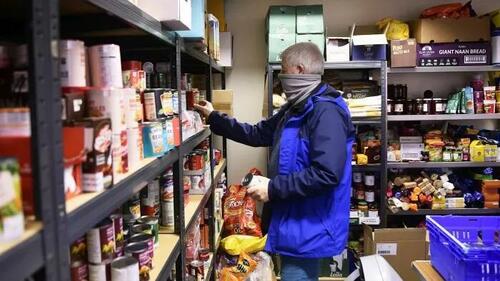UK Households Struggle As Inflation Hits 30-Year High, New Taxes Kick In
Millions of Britons who previously found themselves financially ‘comfortable’ are feeling the heat over accelerating inflation, record energy bills, and tax increases which kick in this year.

According to the Bank of England, scorching inflation will result in the largest drop in disposable income in 30 years when adjusted for inflation.
In April, UK energy bills are due to jump 54% to around 2,000 pounds ($2,723) a year per household. While some of it will be offset by emergency government support – and social security will also increase, it will be against the backdrop of rising interest rates according to Reuters.
“There’s just too much going up at once,” said 38-yaer-old care worker Nicola Frape, who huddles under blankets with her 14-year-old daughter to conserve heat, and have limited roadtrips due to the price of gas. “The pressure is just going to be even worse in April,” she added.
With economies around the world rebounding from coronavirus lockdowns, prices for everything from food and clothes to haircuts and rent, as well as energy are going up, fuelled by resurgent demand and shortages due to supply chain disruptions.
Accurate national comparisons of changes in living standards are hard to make but concerns about inflation are emerging as a big factor in elections including France’s presidential race in April and U.S. midterm elections in November. -Reuters
A February survey found that the number of people experiencing food insecurity was 20% higher in January than the previous six months, according to FT.
The decline in living standards for much of the UK population prompted chancellor Rishi Sunak last week to announce a £9bn package to help struggling households.
On the same day energy regulator Ofgem announced a 54 per cent rise in energy bills and the Bank of England increased interest rates from 0.25 per cent to 0.5 per cent. It warned inflation could hit 7.25 per cent by April, threatening to limit people’s spending power as a planned increase in National Insurance contributions reduces their take-home pay.
In January, Britain’s consumer price inflation hit 5.5% y/y, the highest since 1992. It’s set to top 7% in April, at which point the BoE thinks they may begin to slow. That said, they also expect it will be above 5% in a year’s time.
In the US, ‘official’ inflation is north of 7% – the highest since the early 1980s.
According to the National Institute of Economic and Social Research think tank, the combination of April’s payroll tax increase plus inflation could result in a 30% rise in destitution across the UK.
The rampant inflation in the UK has sent government interest rates soaring – hitting £6.1bn last month, the highest amount for a January since records began in April 1997 and up from £4.5bn last year, the BBC reports.
The payments are pegged to the Retail Prices Index (RPI) measure of inflation – which reached 7.8% in January.
January’s interest payments were, however, below the all-time high of £9bn in June last year.
Paul Johnson, director of the Institute for Fiscal Studies, told the BBC it was worth noting that “overall interest payments by the government are still at remarkably low levels” despite UK debt levels at the highest for 60 years. -BBC
Meanwhile between April and September of 2021, food bank deliveries rose 11% vs. the same period in 2019, hitting one of its highest levels ever in December. At one West London food bank, Dad’s House, some of the former donors to the charity are now recipients of support.
“I have to pay my bills,” said Jackie Gordon, 52. “I’m behind with my rent and I don’t want to get evicted.”
Rebecca McDonald, a senior economist at the Joseph Rowntree Foundation, said this year will likely leave a lasting mark on poorer households regardless of whatever inflation does.
“It’s going to feel like a much more longer-term issue because this year is going to be incredibly difficult,” she said, adding that many formerly financially sound families will likely go into debt this year.
Tyler Durden
Wed, 02/23/2022 – 04:15
Zero Hedge’s mission is to widen the scope of financial, economic and political information available to the professional investing public, to skeptically examine and, where necessary, attack the flaccid institution that financial journalism has become, to liberate oppressed knowledge, to provide analysis uninhibited by political constraint and to facilitate information’s unending quest for freedom. Visit https://www.zerohedge.com
